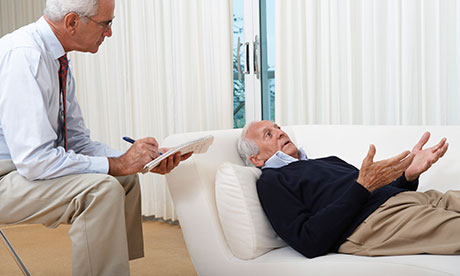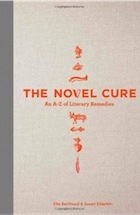Gavin Francis signs up for a course of bibliotherapy as a cure for emotional and physical pain

Ella Berthoud and Susan Elderkin prescribe only fiction, which they call 'the purest and best form of bibliotherapy'. Photograph: Rolf Bruderer/Corbis
A man came into my GP surgery the other day, sat down on the seat next to my desk, and spread his palms. "I'm in a state of anguish," he said, "and there's probably nothing you can do or say that's going to help me." It's relatively unusual to be able to articulate your emotions that accurately, and even more unusual to second-guess the limited options offered by western pharmacocentric medicine. Instead of drugs I offered what most doctors do: a space for reflection, a supportive conversation, the experience of having witnessed others pass through similar low points in their lives.
He was a reader, which makes it easier; my health board provides a list of titles stocked in the city's libraries and recommended by the local psychiatric services. There's Beat Depression & Reclaim Your Life, there's Overcoming Anxiety, with its focus on panic attacks, then there's the Haynes manual-sounding Manage Your Mind. There are titles tailored for adults, adolescents and children covering topics such as anorexia, bulimia, coping with bereavement, and obsessive-compulsive disorder.
After printing out the list we had a conversation about which of these books, if any, might be of help. Sometimes I've added a couple of my own: Andrew Solomon's Far From the Tree for parents struggling with the demands of caring for a disabled child; William Styron's Darkness Visible for those who've slipped into profound despa
 It has taken a while for my health board to realise the benefits of bibiliotherapy, but the idea is an old one. Seneca wrote his Consolation to Marcia almost two thousand years ago, but it is still powerful advice for a mother mourning the death of her son. Robert Burton's sprawling Anatomy of Melancholy is an intermittently helpful, but always involving, series of meditations on sadness and its alleviations. Absurd as it sounds, books like these would now be crammed into a lumpy genre called "literary non-fiction", but in his Religion for Atheists Alain de Botton makes the claim that since the latter half of the 19th century we've turned to fiction rather than non-fiction to encourage self-examination. "English literature now has a triple function," he quotes George Stuart Gordon, "to delight and instruct us, but also, and above all, to save our souls and heal the State."
It has taken a while for my health board to realise the benefits of bibiliotherapy, but the idea is an old one. Seneca wrote his Consolation to Marcia almost two thousand years ago, but it is still powerful advice for a mother mourning the death of her son. Robert Burton's sprawling Anatomy of Melancholy is an intermittently helpful, but always involving, series of meditations on sadness and its alleviations. Absurd as it sounds, books like these would now be crammed into a lumpy genre called "literary non-fiction", but in his Religion for Atheists Alain de Botton makes the claim that since the latter half of the 19th century we've turned to fiction rather than non-fiction to encourage self-examination. "English literature now has a triple function," he quotes George Stuart Gordon, "to delight and instruct us, but also, and above all, to save our souls and heal the State."
More
He was a reader, which makes it easier; my health board provides a list of titles stocked in the city's libraries and recommended by the local psychiatric services. There's Beat Depression & Reclaim Your Life, there's Overcoming Anxiety, with its focus on panic attacks, then there's the Haynes manual-sounding Manage Your Mind. There are titles tailored for adults, adolescents and children covering topics such as anorexia, bulimia, coping with bereavement, and obsessive-compulsive disorder.
After printing out the list we had a conversation about which of these books, if any, might be of help. Sometimes I've added a couple of my own: Andrew Solomon's Far From the Tree for parents struggling with the demands of caring for a disabled child; William Styron's Darkness Visible for those who've slipped into profound despa
 It has taken a while for my health board to realise the benefits of bibiliotherapy, but the idea is an old one. Seneca wrote his Consolation to Marcia almost two thousand years ago, but it is still powerful advice for a mother mourning the death of her son. Robert Burton's sprawling Anatomy of Melancholy is an intermittently helpful, but always involving, series of meditations on sadness and its alleviations. Absurd as it sounds, books like these would now be crammed into a lumpy genre called "literary non-fiction", but in his Religion for Atheists Alain de Botton makes the claim that since the latter half of the 19th century we've turned to fiction rather than non-fiction to encourage self-examination. "English literature now has a triple function," he quotes George Stuart Gordon, "to delight and instruct us, but also, and above all, to save our souls and heal the State."
It has taken a while for my health board to realise the benefits of bibiliotherapy, but the idea is an old one. Seneca wrote his Consolation to Marcia almost two thousand years ago, but it is still powerful advice for a mother mourning the death of her son. Robert Burton's sprawling Anatomy of Melancholy is an intermittently helpful, but always involving, series of meditations on sadness and its alleviations. Absurd as it sounds, books like these would now be crammed into a lumpy genre called "literary non-fiction", but in his Religion for Atheists Alain de Botton makes the claim that since the latter half of the 19th century we've turned to fiction rather than non-fiction to encourage self-examination. "English literature now has a triple function," he quotes George Stuart Gordon, "to delight and instruct us, but also, and above all, to save our souls and heal the State."More
No comments:
Post a Comment